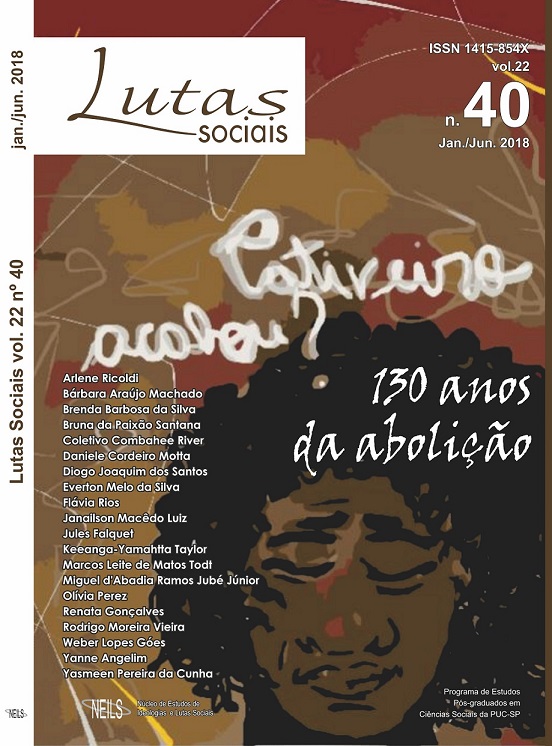História do Coletivo Combahee River
DOI:
https://doi.org/10.23925/ls.v22i40.46660Palavras-chave:
Coletivo Combahee River, feminismo negro, movimento feminista, racismoResumo
Inscrito na continuidade das lutas ininterruptas das mulheres negras desde o período da escravidão, o Black Feminism ou o Feminismo Negro, emergiu publicamente nos Estados Unidos no final dos anos 1960. Durante muito tempo desconhecido – com poucos textos traduzidos – hoje há um interesse cada vez maior por este movimento. De fato, suas ações e sua reflexão pioneiras sobre a imbricação das relações sociais (de sexo, de raça e de classe) são particularmente estimulantes para pensarmos em conjunto sobre o racismo e o sexismo (sem negligenciar a classe), o que é uma das urgências das lutas atuais.Referências
BREINES, Winifred. Learning about racism: white socialist feminism and bread and roses. In: The trouble between us: an uneasy history of white and black women in the feminist movement. New York: Oxford University Press, 2006.
CLARKE, Cheryl. The Failure to Transform: Homophobia in the Black Community. In: SMITH, Barbara. (org.). Home girls: a black feminist anthology. New Brunswick, New Jersey & London: Rutgers University Press, p.190-201, 2000.
DAVIS, Angela. Reflections on the black woman’s role in the community of slaves. Black Scholar, vol. 3, n. 4, p. 3-15, 1971.
HARDING, Sandra. Is science multicultural? Postcolonialism, feminism, and epistemologies. Bloomington: Indiana University Press, 1998.
HARRIS, Duchess. All of Who I am in the Same Place: The Combahee River Collective. Womanist Theory and Research, vol. 3, n. 1, 1999.
COLLINS, Patricia Hill. Black sexual politics. African Americans, gender, and the new racism. New York & London: Routledge, 2005.
GUILLAUMIN, Colette. Sexe, race et pratique du pouvoir: l’idée de Nature. Paris: Côté-femmes, 1992.
hooks, bell. Feminist theory: from margin to center. Cambridge: South End Press. Classics Series, vol. 5, 1984.
________. Talking back: thinking feminist, thinking black. Cambridge: South End Press, 1989.
HULL, Gloria T.; BELL SCOTT, Patricia; SMITH, Barbara (orgs.). All the women are white, all the blacks are men, but some of us are brave: black women's studies. New York, Old Westbury: The Feminist Press, 1982.
LORDE, Audre. Sister outsider: essays and speeches. New York: Crossing Press, 1984.
MATHIEU, Nicole-Claude. Identité sexuelle/sexuée/de sexe? Trois modes de conceptualisation du rapport entre sexe et genre. In: MATHIEU, Nicole-Claude. L’anatomie politique. Catégorisations et idéologies du sexe. Paris: Côté-femmes Editions. p. 227-266, 1991.
MILLET, Kate. La politique du mâle. Paris: Stock, 1972.
RUBIN, Gayle. The traffic in women: Notes on the “political economy” of sex. In: REITER, Rayna R. (org). Toward an anthropology of women. New York: Monthly Review Press, 1975.
SMITH, Barbara (org.). Home girls: a black feminist anthology. New York: Kitchen Table/Women of Color Press, 1983.
SPRINGER, Kimberly. Living for the Revolution: black feminist organizations, 1968-1980. Durham & London: Duke University Press, 2005.
Springer, Kimberly (1999). Still Lifting, Still Climbing: Contemporary African American Women's Activism. New York : New York University Press, 1999.
WALKER, Alice. In search of our mother’s garden. Harcourt Brace Jovanovich: Publishers. New York, 1983.
WALLACE, Michèle. Black macho and the myth of the superwoman. London: Verso, 1999.
WITTIG, Monique. La pensée straight. Paris: Balland, 2001.
YUVAL DAVIS, Nira. Gender and nation. Londres: Sage Publications,1997.
Downloads
Publicado
Como Citar
Edição
Seção
Licença
Matérias assinadas não expressam necessariamente a posição do coletivo da revista e são de exclusiva responsabilidade do(a)s respectivo(a)s autore(a)s.
Ao enviar seus textos, o(a)s autore(a)s cedem seus direitos à Lutas Sociais, que autoriza, com prévia permissão do Comitê Editorial, a reprodução das publicações, desde que conste o crédito de referência.



